| Srl | Item |
| 1 |
ID:
121028
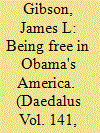

|
|
|
|
|
| Publication |
2012.
|
| Summary/Abstract |
Many studies of interracial differences in rates of political participation pay too little attention to African Americans' perceptions of whether they can freely participate in politics. Survey evidence collected over the last several decades has consistently shown that black Americans perceive much less political freedom available to them than do white Americans. The gap in perceived freedom has narrowed somewhat in recent years but remains large. Following the empowerment hypothesis of Lawrence Bobo and Franklin Gilliam, black perceptions of freedom increased with the election of Barack Obama to the American presidency. But perhaps unexpectedly, the empowerment bonus has not persisted, especially among conservative and fundamentalist blacks. Because African Americans do not perceive that their government would permit various types of political action, it is likely that substantial interracial differences exist in non-voting types of political participation, especially political action directed against governmental authority.
|
|
|
|
|
|
|
|
|
|
|
|
|
|
|
|
| 2 |
ID:
121026
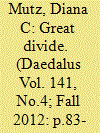

|
|
|
|
|
| Publication |
2012.
|
| Summary/Abstract |
There is a huge difference between public perceptions of the power of media in elections and academic evidence of its influence. This gap stems from the fact that the public uses different forms of evidence than academics use to infer media power. This essay outlines the reasons for this great divide, then highlights the seriousness of its consequences for the allocation of political resources. Public beliefs in omnipotent media contribute to wasted time and money; ultimately, they undermine the legitimacy of election outcomes.
|
|
|
|
|
|
|
|
|
|
|
|
|
|
|
|
| 3 |
ID:
121024
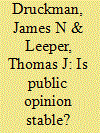

|
|
|
|
|
| Publication |
2012.
|
| Summary/Abstract |
Public opinion matters, both as a central element of democratic theory and as a substantive foundation for political representation. The origins and nature of public opinion have long attracted the attention of social scientists. Yet a number of questions remain; among the more perplexing is whether-and under what conditions-public opinion is stable. The answer depends in large part on whether one looks at aggregations of individual opinions (macro public opinion) or at the individual opinions themselves (micro public opinion). In this essay, we explore the macro/micro divide and offer a framework to determine when opinions are likely to be stable or volatile. This framework reflects both the content of the political environment and the nature of individuals' opinions. Using public opinion dynamics surrounding the Patriot Act as a primary example, we discuss the role of opinion stability in interpreting public opinion and in understanding the normative implications of public preferences.
|
|
|
|
|
|
|
|
|
|
|
|
|
|
|
|
| 4 |
ID:
121027
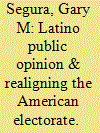

|
|
|
|
|
| Publication |
2012.
|
| Summary/Abstract |
The growth and significance of the Latino electorate raises important questions about its preferences, identity, and impact. In this essay, I explore three facets of Latino public opinion and offer thoughts regarding their political impact. First, I demonstrate that Latino core beliefs about the role of government are progressive. Second, I explore the ways in which national origin, nativity, and generational status reveal important differences in how Latinos think about and participate in politics; I caution against over-interpreting the importance of these differences. Finally, I offer evidence that Latino panethnic identity is sufficiently developed to constitute a political "group." Given that this segment in the American electorate is increasingly unified and demonstrably left of center, I suggest that the growth of the Latino population and electorate could have substantial electoral and social impact.
|
|
|
|
|
|
|
|
|
|
|
|
|
|
|
|
| 5 |
ID:
121021


|
|
|
|
|
| Publication |
2012.
|
| Summary/Abstract |
We discuss the history of the exit poll as well as its future in an era characterized by increasingly effective and inexpensive alternatives for obtaining information. With respect to the exit poll's future, we identify and assess four purposes it might serve. We conclude that the exit poll's most important function in the future should, and probably will, be to provide information about the administration of the franchise and about the voter's experience in casting a ballot. The nature of this purpose suggests that it may make sense for academic institutions to replace media outlets as the primary implementers of exit polls.
|
|
|
|
|
|
|
|
|
|
|
|
|
|
|
|
| 6 |
ID:
121020
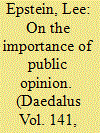

|
|
|
| 7 |
ID:
121022


|
|
|
|
|
| Publication |
2012.
|
| Summary/Abstract |
Public policy mood, a concept now more than twenty years old, is the measure of left/right preferences over policy choices in American politics. In this essay, I comment on the theoretical need for such a measure and discuss the strategy for estimation. I produce the measure itself for the years from 1952 to 2011. Then I take on the question of how many dimensions of such operational ideology exist. I find two, which is far from novel. But unlike much previous work, my own included, the present analysis utilizes prior theoretical information about the content of the dimensions in order to interpret them. I find the conventional two dimensions, economic and cultural, to be very highly correlated. A final section explores the thermostatic properties of mood.
|
|
|
|
|
|
|
|
|
|
|
|
|
|
|
|
| 8 |
ID:
121025
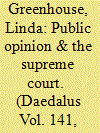

|
|
|
|
|
| Publication |
2012.
|
| Summary/Abstract |
The relationship between the Supreme Court and public opinion remains ambiguous, despite efforts over many years by scholars both of the Court and of mass behavior to decipher it. Certainly Supreme Court Justices live in the world, and are propelled by the political system to their life-tenured positions. And certainly the Court, over time, appears to align itself with the broadly defined public mood. But the mechanism by which this occurs-the process by which the Court and the public engage one another in a highly attenuated dialogue-remains obscure. The Court's 1973 abortion decision, Roe v. Wade, offers a case in point. As the country began to reconsider the wisdom of the nineteenth-century criminalization of abortion, which voices did the Justices hear and to which did they respond? Probing beneath the surface of the public response to Roe serves to highlight rather than solve the puzzle.
|
|
|
|
|
|
|
|
|
|
|
|
|
|
|
|
| 9 |
ID:
121023


|
|
|
|
|
| Publication |
2012.
|
| Summary/Abstract |
My book "The Macro Polity," coauthored with Michael B. MacKuen and James A. Stimson and published in 2002, depicts the dynamics of public opinion and electoral politics in the United States at the macro level; the analysis is based on micro-level foundations of micro-level political behavior. This essay presents the book's main arguments, in some instances extending the analysis beyond its original 1956-1996 time frame to incorporate data from the George W. Bush administration. The central thesis is that there is more rationality and predictability to American politics when viewed in the aggregate than one might infer from considering only the limited political awareness of the average citizen.
|
|
|
|
|
|
|
|
|
|
|
|
|
|
|
|